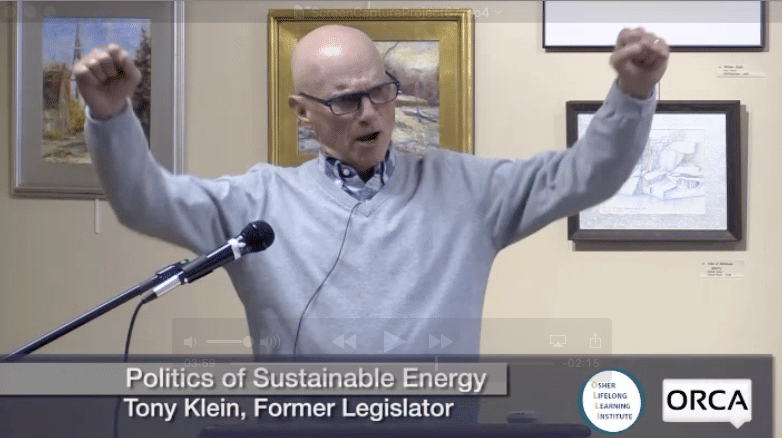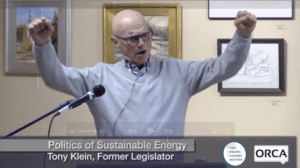Self-Described Antinuclear, Pro-Renewable Former Vermont Legislator Claims “We were angels, doing God’s work.”
Tony Klein, a former Vermont legislator who played an important role in Vermont energy law creation during the last decade, recently gave a fascinating talk at the Osher Lifelong Learning Institute at the University of Vermont.
Fortunately for those of us with a deep interest in energy politics, the talk was competently recorded for posterity and world-wide distribution. Audience interest and participation in his talk was stimulated by an unplanned coincidence; he spoke about a week after Vermont, like most of New England, suffered from widely distributed power outages.
Klein’s talk lasts about an hour, but it will be time well-invested for those seeking to gain insights into how renewable energy advocates carried the water for Green Mountain Power in its quest to dominate Vermont’s electricity supply system.
What information did Tony Klein share?
Klein began his talk by describing his entry into the energy production conversation as an activist in the antinuclear movement and his personal development as a member of the ‘back to the land” movement.
Aside: That migration of liberal utopians to Vermont made a big impact starting in the late 1960s and 1970s with continuing influence ever since.
There is a reasonable chance that you will watch White Christmas in the near future. There is a revealing exchange about Vermont politics in that 1954 film.
Bing Crosby: “So tell me, what do you think would be a novelty up here in Vermont?”
Danny Kaye: “Who knows, maybe we can dig up a Democrat.”
It’s probably an understatement to note that “back to the land” movement helped to alter Vermont’s political leanings. End Aside.
Klein describes how he moved from his activist roots and began working in the energy industry as a marketer for Blue Flame Gas. One of his tasks there was to develop a program to convince customers to convert from electric water heaters to natural gas water heaters.
The company wanted to reduce the sharp swings in seasonal demand. He suggested a program to his bosses that would convert customers from electric water heaters to propane or gas water heaters. His company worked with electric utility companies that were interested in reducing electricity sales to provide new hydrocarbon-burning water heaters with financing repaid via electricity bills.
When he left that job he formed a lobbying group that represented independent power producers, Renewable Energy Vermont and Efficiency Vermont.
In 2002, he took advantage of an open seat created by redistricting and was elected to serve in the state legislature, representing east Montpelier and Middlesex. He held his seat for seven 2-year terms.
He began serving on the House Natural Resources and Energy Committee during his second term and was the chairman of that Committee for his final four terms. He humbly called himself a witness to Vermont’s energy system transformation. A more accurate term might be be “leading actor” or “player.”
At least three times during the talk, Tony claims that he and his compatriots believed that they were “angels, doing God’s work.” He expresses a fair amount of contrition for leading a energy supply revolution that seems to be failing with uncomfortable consequences.
He explains how he decided not to run for another term because he just couldn’t deal with all of the negativity and finger-pointing that was growing in intensity as the results of his numerous legislative efforts became increasingly apparent.
Just before the 19 minute time mark, he mentions that the room would not have been large enough to contain the audience if he he was still serving as Chair of the House Natural Resources and Energy Committee. He noted that there would be a “whole lot of people who didn’t like me and would accuse me of a lot of different things.”
During the period from 1998 – 2014, the Vermont legislature passed 18 separate acts that Klein describes as having had a major impact on its energy supply choices. He says, “they were all passed unanimously – except for 1, 2, 3 – 6 of them.”
Warning – please do not take a sip of hot coffee around the 28 minute mark. Right after that Klein claims that Vermont imported almost all of its electrical power in the 1990s.
Those of us who know where to find the data (p. 273) could point out to Mr. Klein that Vermont was a net exporter of electricity in 1998, with the vast majority of the electricity produced inside the state borders coming from a single nuclear power plant – Vermont Yankee.
As a direct result of that well-run, virtually emission-free plant, Vermont’s electricity supply was the cleanest in the nation with the following ranks among states (including D.C.) on reported polluting gases.
Sulfur Dioxide 51
Nitrogen Oxide 51
Carbon Dioxide 51
Klein also mentions that Vermont experienced an ice storm in the late 1990s that brought down the transmission line from Hydro Quebec. It took 5-6 weeks for that power line to be restored. During the outage, utilities in the state had to purchase their power on the open market and spent enough to “almost drive them into bankruptcy.”
The state is no less dependent today on power imported from Hydro Quebec than it was then. Some advocate even more imports via transmission lines from that distant power source.
That summarizes the first 30 minutes of the video. I hope it has whetted your appetite enough to encourage you to watch for yourself to see a master salesman explain away his contributions to the creation of Vermont’s fragile power system.



“Restoring power will be difficult because the storm did not hit one particular region especially hard. Instead, the strong winds sent trees tumbling and severed power lines in virtually all corners of Vermont.”
Only you could turn that into supporting centralized power plants, which depend on power lines. I’ll bet the natural gas lines, mostly underground, suffered little damage.
@PU239
You misunderstood my reference. I was only pointing out that in the aftermath of a power outage, people are much more interested in the power system and how it came to be. Mr. Klein made a number of statements referencing that fact.
Pu239.
Just a note that Vermont has one gas pipeline. It used to serve only the Burlington region, but after three years of construction and an almost 100% cost overrun, the pipeline has been extended 41 miles and also serves Middlebury.
The pipeline extension was so unpopular that I doubt that any more pipelines are likely to be built.
In Vermont, propane and oil for home heating are delivered by truck.
https://vtdigger.org/2017/07/14/state-regulators-investigate-vermont-gas-pipeline-burial-depth/#.WhXVSjLMwUE
https://vtdigger.org/2016/06/22/vermont-gas-pipeline-costs-jump-7-8-percent-to-165-6-million/#.WhXWwzLMwUE
Hey Rod, I don’t understand the movie quote: “Who knows, maybe we can dig up a Democrat.” Could you give some insight?
I also don’t understand Pu239’s point; maybe he wants to go live off the grid somewhere with only a gas pipe going to his cabin.
@scaryjello
The quote from White Christmas (1954) indicates that Democrats were rare in VT. It was a state with a large majority of Republicans (or independents).
“angels, doing God’s work.”
People who think like that have put a giant roadblock in the way figuring out if they are wrong & correcting themselves
What would be the response from the crowd/speaker if Meredith Angwin (Yes Vermont Yankee blog author) were to roll up hot with a sweater to knit in the front row and interject with the virtues of the VY plant, explaining how the loss generation has been replaced one-for-one with natural gas?
In addition to the inaccuracies mentioned, Tony Klein also states that electricity losses from transmission are “anywhere from 15-50%” – EIA data puts the loss at 7% with long distance losses at 10%. His miss information appears to contradict his support of remote ridge-line wind projects, which requires long distant transmission lines. Additionally, utility scale wind projects, with towering 1.5-3 MW turbines, also appear to contradict the ‘back to land’ idea of locally growing your own food, chopping your own wood, and generating your own power with distributed solar and micro wind. The only consistency I find with so called renewable advocates (with ideas ranging from PV w/ powerwalls to hot rock storage to continual super grids), is their unified opposition to nuclear.